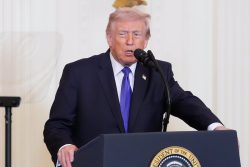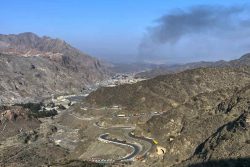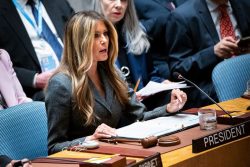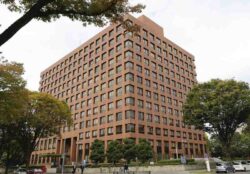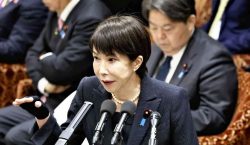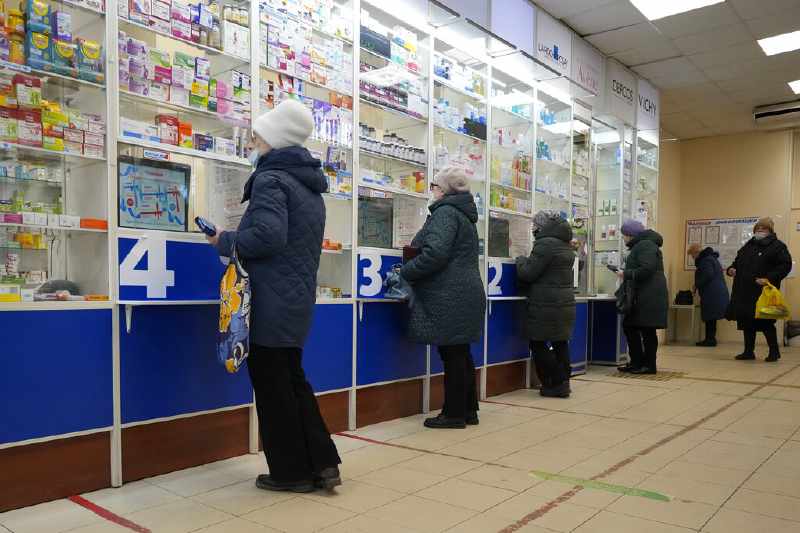
Customers stand at the windows buying medicines in a pharmacy in St. Petersburg, Russia, Friday, April 1, 2022.
17:07 JST, April 3, 2022
First came the warnings, in messages among friends and families and on social media, to stock up on vital drugs in Russia before supplies were affected by crippling Western sanctions over the invasion of Ukraine.
Then, some drugs indeed became harder to find at pharmacies in Moscow and other cities.
“Not a single pharmacy in the city has it now,” a resident of Kazan told The Associated Press in late March about a blood thinner her father needs.
Experts and health authorities in Russia say the drug shortages are temporary — due to panic- buying and logistical difficulties for suppliers from the sanctions — but some remain worried that high-quality medicines will keep disappearing in the Russian market.
“Most likely there will be shortages. How catastrophic it will be, I don’t know,” said Dr. Alexey Erlikh, head of the cardiac intensive care unit in Moscow Hospital No. 29, and a professor at the Moscow-based Pirogov Medical University.
Reports that Russians could not find certain medications in pharmacies started surfacing in early March, shortly after Moscow unleashed a war on Ukraine, and sweeping sanctions left Russia increasingly isolated from the rest of the world.
Patient’s Monitor, a patients’ rights group in the Russian region of Dagestan on the Caspian Sea, began getting complaints in the second week of March.
Ziyautdin Uvaysov, head of the group, told AP he personally checked with several state-run pharmacies in the region on the availability of 10 most-wanted medications and “they didn’t have a large number of these.”
Uvaysov added that when he asked about when supplies would be restocked, the pharmacies replied that “there aren’t any and it’s unclear when there will be.”
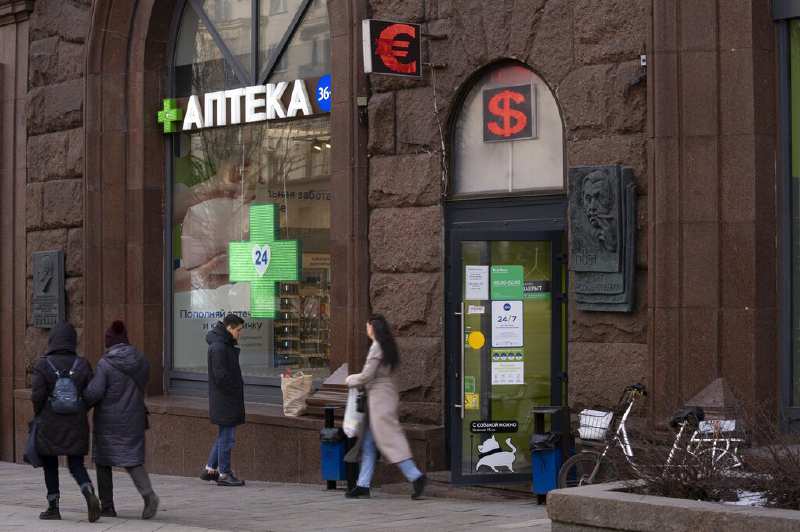
People walk past a pharmacy and a currency exchange on a main street in Moscow, Russia, Friday, April 1, 2022.
Despite assurances from authorities that hoarding of supplies was to blame for the quickly emptying shelves, reports about shortages persisted throughout March.
Vrachi.Rf, one of Russia’s biggest online communities for medical workers, surveyed more than 3,000 doctors in mid-March, and they said they had run into shortages of more than 80 medications: anti-inflammatory, gastrointestinal, antiepileptic and anticonvulsant drugs, as well as antidepressants and antipsychotics.
About a dozen people contacted by the AP in different cities in late March said they had spent days searching for certain thyroid medications, types of insulin or even a popular pain-relieving syrup for children. Some said they were unable to find them at all.
“Patients I treat have lost some blood pressure medications,” Erlikh said. “And some doctors I know are reporting problems with certain very expensive, very important medications (used in) certain surgical procedures.”
Russian Health Minister Mikhail Murashko has repeatedly given assurances that drug availability is not a problem in the country and has blamed any shortages on panic-buying. He said the demand for certain drugs has spiked tenfold in recent weeks, and he has urged Russians not to hoard the medications.
Experts agree that panic-buying has played a role in creating drug shortages.
“People rushed to stock up, and in some cases, supplies that were supposed to last a year or a year and a half were bought out within a month,” Nikolay Bespalov, development director of the RNC Pharma analytical company, told AP.
Bespalov also pointed to logistical problems that occurred early in the crisis. While major Western pharmaceutical companies pledged not to withdraw vital medications from the Russian market, sanctions cut Russia’s key banks from the SWIFT financial messaging system, hindering international payments. Dozens of countries halted air traffic with Russia, disrupting supply chains.
The expert stressed the logistical issues have been largely resolved, but panic-buying, prompted by fears that foreign companies will halt supplies, may continue fueling shortages for some time.
“Clearly, until the emotions calm down, it will continue,” Bespalov said.
Local news sites — from Vladimir, just east of Moscow, to the Kemerovo region in Siberia — reported shortages of various medications in the final days of March amid continued panic-buying.
Russia’s health care watchdog Roszdravnadzor, however, said in a statement Friday that “the situation on the drug market is gradually returning to normal, panic-buying of pharmaceuticals is decreasing.”
Erlikh, the cardiologist, pointed to already-existing problems with quality medications in Russia, which according to some estimates imports up to 40% of its drugs.
After authorities launched an import substitution policy to counter sanctions over the 2014 annexation of Crimea and to promote its own medications over foreign-made ones, shortages of certain imported drugs became a problem.
The policy outlined a wide range of preferences to Russian businesses and eventually made it unprofitable for foreign pharmaceutical companies to supply some of their expensive, high-quality drugs to Russia.
In 2015, state procurement of drugs for hospitals and state-funded clinics, which account for up to 80% of Russia’s pharmaceutical market, became subject to the “three’s a crowd” rule, which excluded foreign businesses if at least two Russian companies were bidding for a contract.
The government also kept adding more drugs to the “vital medicines” list — a registry of over 800 essential drugs, for which the authorities set obligatory — and relatively low — prices. Companies can apply for changing the set price once a year, but the process is long, heavily bureaucratic and doesn’t lead to a guaranteed result.
“We have already been gradually losing one important original medication after another. Generics are taking their place, and while there are some rather good ones made in Europe, there are also some dubious ones made in Russia,” Erlikh said.
“Of course, when there is no original medication, a generic is better than nothing. But it is a situation of (deliberately) lowering the bar, it is not a good way to live,” he added.
Top Articles in News Services
-

Survey Shows False Election Info Perceived as True
-

Hong Kong Ex-Publisher Jimmy Lai’s Sentence Raises International Outcry as China Defends It
-

Japan’s Nikkei Stock Average Touches 58,000 as Yen, Jgbs Rally on Election Fallout (UPDATE 1)
-

Japan’s Nikkei Stock Average Falls as US-Iran Tensions Unsettle Investors (UPDATE 1)
-

Japan’s Nikkei Stock Average Rises on Tech Rally and Takaichi’s Spending Hopes (UPDATE 1)
JN ACCESS RANKING
-

Producer Behind Pop Group XG Arrested for Cocaine Possession
-

Japan PM Takaichi’s Cabinet Resigns en Masse
-

Man Infected with Measles Reportedly Dined at Restaurant in Tokyo Station
-

Israeli Ambassador to Japan Speaks about Japan’s Role in the Reconstruction of Gaza
-

Videos Plagiarized, Reposted with False Subtitles Claiming ‘Ryukyu Belongs to China’; Anti-China False Information Also Posted in Japan


